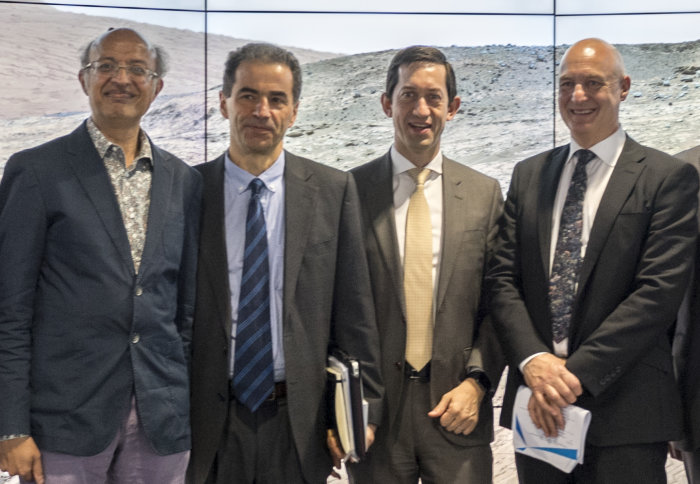Portuguese Science Minister discusses energy and health innovation at Imperial

Portugal’s Minister of Science, Technology and Higher Education, Professor Manuel Heitor, met with Imperial academics and researchers.
Professor Heitor, who holds a PhD from Imperial in Mechanical Engineering, saw demonstrations at the Hydrodynamics Laboratory and Data Science Institute during his visit to strengthen ties between Portugal and Imperial.
The Minister was accompanied by a delegation from Portugal including representatives from leading institutions.
They were joined on the visit by Portuguese academic Professor Francisco Veloso, Dean of Imperial College Business School, and Vice President (Innovation) Professor David Gann.

The delegation met Imperial’s President Alice Gast, Vice Provost (Research and Enterprise) Professor Nick Jennings and Vice President (International) Professor Maggie Dallman to discuss opportunities for greater collaboration.
Professor Tim Green, Director of Energy Futures Lab and Dr Yannis Karmpadakis, from the Department of Civil & Environmental Engineering, gave a tour of the Hydrodynamics laboratory.
Ocean currents
 They demonstrated Imperial’s wave basin, the largest research facility of its kind in the UK, which can accurately model both deep and shallow water marine environments through use of an adjustable bed system.
They demonstrated Imperial’s wave basin, the largest research facility of its kind in the UK, which can accurately model both deep and shallow water marine environments through use of an adjustable bed system.
Dr Karmpadakis explained: “The basin can generate currents found in oceans and then we can put different structures in and generate forces felt by the sea. It allows us to experiment with structures such as oil platforms.”
Precision medicine

Professor Heitor then visited the Data Observatory, the largest of its kind in Europe.
Professor Yike Guo, Director of the Data Science Institute, presented data on asthma precision medicine.
The Innovative Medicines Initiative (IMI) ‘Unbiased Biomarkers in the Prediction of Disease’ (U-BIOPRED) project contains samples and medical information from hundreds of adults and children with severe asthma.
The system can select a specific patient cohort based on the chosen clinical parameters, and analyse the genetic and genomic data of the patient cohort to identify the set of genes which are most likely to cause asthma.
Professor Guo said “The Data Observatory allows us to organise clinical studies in a visual way.”

Professor of Earth Science Sanjeev Gupta used the observatory’s 64 monitors to present high-resolution images taken from the Mars Rover.
Leading Portuguese academics
 The delegation then spent time hearing from some of Imperial’s leading Portuguese academics; Dr Ana Costa-Pereira and Dr Ana Luisa Neves from the Department of Surgery and Cancer, Dr Joao Cabral from the Department of Chemical Engineering, Dr Pedro Rosa Dias and Dr Marisa Miraldo from the Business School, Dr Soraia Pimenta from the Department of Mechanical Engineering, Professor Silvestre Pinho from the Department of Aeronautics and Dr Joana Portugal Pereira from the Centre for Environmental Policy.
The delegation then spent time hearing from some of Imperial’s leading Portuguese academics; Dr Ana Costa-Pereira and Dr Ana Luisa Neves from the Department of Surgery and Cancer, Dr Joao Cabral from the Department of Chemical Engineering, Dr Pedro Rosa Dias and Dr Marisa Miraldo from the Business School, Dr Soraia Pimenta from the Department of Mechanical Engineering, Professor Silvestre Pinho from the Department of Aeronautics and Dr Joana Portugal Pereira from the Centre for Environmental Policy.

Dr Marisa Miraldo presented her research into eating habits at the World Economic Forum in Davos earlier this year.
Dr Ana Luisa Neves has invented a revolutionary finger prick test that allows for the early identification of diseases which can impact on pregnancy.
Portuguese collaboration
Imperial publishes more than 125 research papers with Portuguese peers every year. Imperial’s top collaborators include Universidade do Porto, Universidade de Lisboa, Universidade de Coimbra, Universidade NOVA de Lisboa and Universidade do Minho.
Imperial has more than 1,000 Portuguese alumni around the world, including Member of the European Parliament, Maria da Graça Carvalho.
Article text (excluding photos or graphics) © Imperial College London.
Photos and graphics subject to third party copyright used with permission or © Imperial College London.
Reporter
Stephen Johns
Communications Division